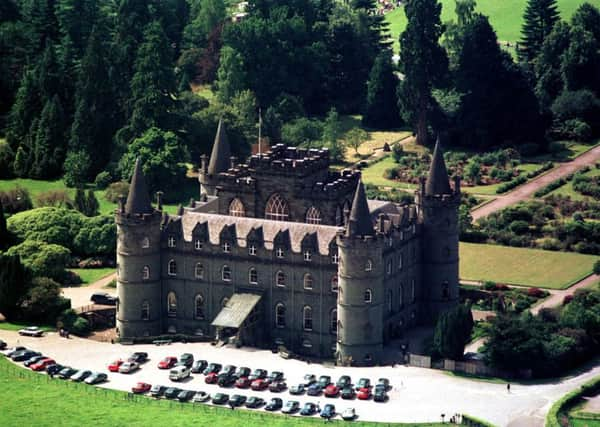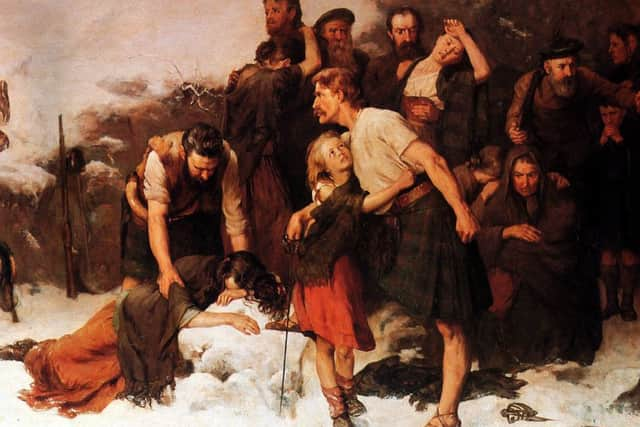Jamie Kelly: Clan Campbell and ‘Britishness’


The Gaels of early-modern Scotland and Ireland are frequently cast together as Britain’s domestic ‘Other’.
Painted with the same broad brush, they were labelled barbarous, insular, indolent, superstitious and – worst of all – Catholic (even in Scotland where in most cases after 1600 they were not).
Advertisement
Hide AdColonial perspectives present them collectively as benighted inhabitants of an aboriginal ‘Gaelic world’ whose values were incompatible with Anglocentric notions of ‘Britishness’.


It was this world upon which the nascent British imperium cut its teeth as an overture to overseas colonial expansion.
Accordingly, events and personalities stemming from the Gaelic-speaking regions are often presented as peripheral, having little bearing on high-politics in London and Edinburgh, and invariably obstructive to the growth of British fellow-feeling.
In sum, Gaelic society has been offered as the antithesis to Britishness: the Highland line and the Irish Sea as the original frontiers of the embryonic imperial project.
How did this perception come into being? At what point did the Gael come to represent the ‘anti-Briton’?
The story of the Campbells of Argyll — a quintessentially Gaelic kindred with Scottish, Irish and British links — provides some explanation for this development in a sixteenth-century context.
Advertisement
Hide AdThey played a prominent role in securing, for good or ill, an unavoidably ’British’ future for Scotland, England and Ireland, yet their ambitions were tempered by circumstance.
The Campbells have been referred to as Scottish history’s ultimate chameleons: convincingly donning Gaelic, Scottish and British masks as audience and circumstance demanded.
Advertisement
Hide AdFrom their heartland on the Western seaboard of Scotland, they were crucial in negotiating the frontiers between Highland and Lowland, Gaelic Scotland and Ireland and, following the Reformation, Scotland and England in the British dimension.
Alongside the MacDonalds, they were quick to adopt neologisms such as ‘North-Briton’ and ‘Brit-Gael’.
The fourth and fifth earls of Argyll were among the most important early supporters of Protestantism and ‘Anglophile’ policies, lending more than their fair share of resources during the Reformation crisis of 1559-60.
The Campbells’ rebirth as a devout, Calvinist clan would have profound implications for the British Isles. At first, naturally aligned with the English court and Protestant magistrates south of the border, the fifth earl worked closely with Elizabeth I’s advisor, Sir William Cecil, in formulating a coherent ‘British’ solution to the problems facing the three kingdoms.
This plan was partly political and partly religious, involving Anglo-Scottish partnership, a strong Campbell presence in the Tudor subjugation of Ulster and the spread of Protestantism among its inhabitants.
While English reservations regarding the presence of Gaelic Scots in Ireland prevented this vision from bearing fruit at this point, the religious blueprint for Argyll’s plan is manifest in John Carswell’s Foirm na n-Urrnuidheadh.
Advertisement
Hide AdPublished in 1567 under the patronage of Argyll, the Foirm is a Gaelic translation — or adaptation — of Knox’s Book of Common Order. It was the first book, Irish or Scottish, to be printed in Gaelic, using the literary script of Classical Common Gaelic. In an unmistakably Calvinist tone, Carswell lays out practical guidelines for worship and building Protestant communities, reserving a prominent role for the institutions of Gaelic society.
He justifies his project, citing the disadvantage suffered by ‘Gaels of Scotland and Ireland […] in that our Gaelic language has never been printed’, pledging with this work to unify the Gaelic world through a shared faith. As well as addressing fellow Gaels, Carswell approaches the matter of Britain:
After that, travel each district
throughout Scotland, gently, slowly,
but, since they have no need of thee
do not take one step into Saxons’ fields.
After that, travel over each wave
to the land of Ireland of liberal bounds
though the friars care little for thee,
move westwards within their sight.
Advertisement
Hide AdThe partnership of Archibald Campbell, fifth earl of Argyll, and John Carswell, Bishop of the Isles, facilitated the swift conversion of large swathes of the Highlands and Islands by adapting the Protestant message to a Gaelic context.
In many cases, the pace of change matched that of the English-speaking Lowlands. Argyll — a man who stood at the intersection of English, Scottish and Gaelic worlds — viewed Protestantism as the long-awaited unifying force that would secure a peaceful future for the British Isles, with a Reformed Gaeldom, spearheaded by ‘Godly chiefs’, at its core. Protestantism was a potential leveller and catalyst of pan-British cultural cohesion. However, English enmity towards Gaelic Scots in Ulster presaged the recurring issue of Anglo-Scottish disagreement over the definition of ‘Britishness’, and the role that the over-mighty England were willing to afford to Scots and Irish who wished to participate in the British project. MacGregor states that Argyll was ‘perhaps the first, but not the last Scottish politician to discover that God was an Englishman’, who, failing in his initial approach, adapted himself to the prevailing English view. This presented Britishness in terms of its compatibility with English interests.
Far from the heart of Britain, Gaelic Scotland and Ireland became hostile, yet conquerable peripheries, while the rejection of Protestantism across the Irish Sea created an irreparable rift in the Gaelic world that had hitherto acted as a key theatre in the making of Britain.
This blog appeared on Four Nations History Network.
Jamie Kelly is a first year PhD student at the University of Glasgow, funded by the Scottish Graduate School of Arts and Humanities.
His research focuses on the Society in Scotland for Propagating Christian Knowledge, an Edinburgh-based charity organisation founded in 1709 with the expressed aim of setting up schools for ’promoting christian knowledge in the Highlands and Islands and the popish and infidel parts of the world’.